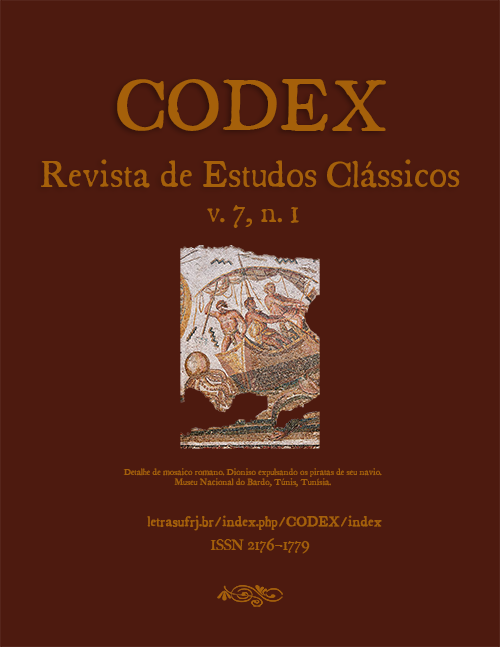Édipo, Odisseu e o retorno da memória
DOI:
https://doi.org/10.25187/codex.v7i1.22448Palavras-chave:
Cicatriz de Odisseu, Erich Auerbach, Mimesis, analogia, Literatura comparada, Akedah, memória de infância, esquecimento, Édipo Rei, recalque, identidade judaicaResumo
A analogia entre Édipo e Odisseu é impressionante e apresenta um caso interessante de intertextualidade, uma vez que sua relação é investigada a partir dos liames entre o enredo do Édipo Rei de Sófocles e o episódio da lavagem dos pés de Odisseu, no Canto XIX. Defendo que o Odisseu homérico forneceu a Sófocles um modelo inspirador para imitação: um homem de meia-idade carrega no seu corpo uma marca de infância da qual se manteve alheio por muitos anos. Após vários anos ausente, o retorno ao lar traz consigo o retorno da memória: a traumática escarificação vem à tona. As cicatrizes de Édipo e Odisseu trazem de volta algo que caíra no esquecimento. Voltando à “Cicatriz de Odisseu” de Auerbach, este artigo aborda a cicatriz como uma junção do esquecimento e da recordação, e mostra como a memória Odisseu e o esquecimento de Édipo estão entrelaçados.
Downloads
Referências
Auerbach, E. Mimesis: The Representation of Reality in Western Literature. Princeton: Princeton University Press, 1974.
Caruth, C. Unclaimed Experience: Trauma, Narrative, and History. Baltimore: The Johns Hopkins University Press, 1996.
Doherty, L. Siren Songs: Gender, Audiences, and Narratives in the Odyssey. Ann Arbor: University of Michigan Press, 1995.
HOMER. Odyssey. Translated by James Huddleston, 2006. Electronic edition: http://digital.library.northwestern.edu/homer/.
HOMERO. Odisseia. Trad. Carlos Alberto Nunes. Rio de Janeiro: Ed. Ediouro, 2001 [1941].
LEV KENAAN, V. The Ancient Unconscious: Psychoanalysis and Classical Texts. Oxford: Oxford University Press, 2019.
Nagy, G. Greek Mythology and Poetics. Ithaca: Cornell University Press, 1990.
PORTER, J. “Erich Auerbach and the Judaizing of Philology”. Classical Inquiry, 35.1, 2008, pp. 115-147.
Shahar, G. “Auerbach’s Scars: Judaism and the Question of Literature”. The Jewish Quarterly Review, 101, 2011, pp. 604-630.
SÓFOCLES. Édipo Rei. Trad. Flávio Ribeiro Oliveira. São Paulo: Ed. Odysseus, 2015.
SOPHOCLES. “Oedipus the King”. In: _______. vol. 1. With an English translation by F. Storr. Cambridge: Harvard University Press, 1912.
_______. Oedipus Rex. Commentaries by DAWE, R. D. Cambridge: Cambridge University Press, 1982.
Vernant, J.-P. “Oedipus without the Complex”. In: _______. & Vidal-Naquet, P. Myth and Tragedy in Ancient Greece. 2. ed. Translated by Janet Lloyd. New York: Zone Books, 1988, pp. 85-112.
Downloads
Publicado
Como Citar
Edição
Seção
Licença
A Codex - Revista de Estudos Clássicos utiliza uma licença Creative Commons - Atribuição-NãoComercial 4.0 Internacional.
Os autores dos trabalhos aprovados autorizam a revista a, após a publicação, ceder seu conteúdo para reprodução em indexadores de conteúdo, bibliotecas virtuais e similares.
A revista se permite o uso dos trabalhos publicados para fins não comerciais, incluindo o direito de enviar o trabalho para bases de dados de acesso público.










